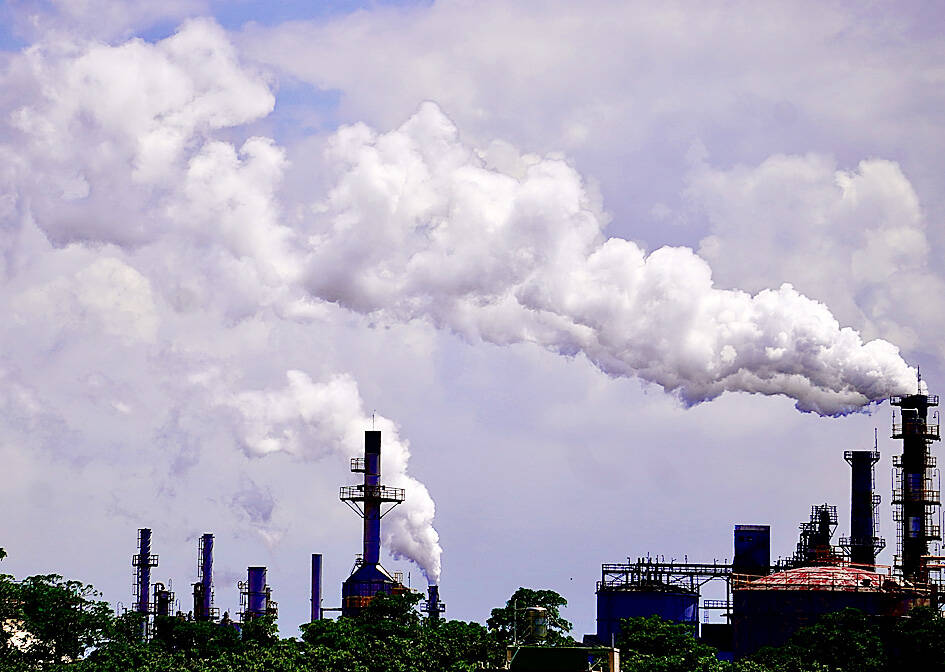Taiwan’s tech and non-tech sectors have mixed reactions to the basic carbon fee recommended by a government review committee, with major electronics companies saying they are ready while petrochemical, steel and cement suppliers urged caution.
The committee on Monday recommended a basic fee of NT$300 per tonne of carbon emissions (tCO2), as well as preferential rates of NT$50/tCO2 and NT$100/tCO2 for companies that meet defined emissions reduction targets.
Carbon fees would not be collected until 2026, while next year would be used as a dry run in which large emitters would only have to report emissions amounts for this year, but would not have to pay carbon fees, the committee said.

Photo: CNA
The recommended fees still have to be approved by the Ministry of the Environment.
In response to the recommendations, the Taiwan Electrical and Electronic Manufacturers’ Association (電電公會) said it has arranged courses for its members every month to help them improve their operations and ease the impact of the new costs.
Many tech heavyweights in Taiwan have prepared themselves for the new rules, but smaller tech firms would need help from the government to mitigate the impact of the additional costs, it said.
Taiwan Semiconductor Manufacturing Co (台積電) said it is determined to abide by the new carbon fee levies and has faith that the new costs would not affect its operations financially, while United Microelectronics Corp (UMC, 聯電) said it would continue its efforts to cut carbon emissions by participating in the government’s schemes to reduce emissions voluntarily and push emission reduction plans.
UMC added that it would apply for carbon offset projects and buy carbon credits on carbon exchanges, while introducing negative emissions technologies and seeking cheaper renewable energy.
However, the Petrochemical Industry Association of Taiwan (石化公會) said the petrochemical industry has been struggling in the regional markets amid overproduction by China and the removal of preferential tariffs on exports to China.
It urged the government to pay close attention to the added financial burden of the new fees, but added that its members would comply with the new carbon fee rules.
China Steel Corp (中鋼) said the carbon fees would no doubt create more challenges, and estimated that it would have to pay NT$200 million to NT$400 million a year under the new system.
TCC Group Holdings Co (台泥企業團) chairman Nelson Chang (張安平) said the best-ever price for cement produced in the country was NT$3,000 per tonne, but if suppliers have to pay NT$3,000 in carbon fees per tonne by 2030, few companies would want to produce cement in Taiwan.
If Taiwan has to completely depend on imported cement, it would deal a hard blow to the nation’s heavy industries, Chang said.

In Italy’s storied gold-making hubs, jewelers are reworking their designs to trim gold content as they race to blunt the effect of record prices and appeal to shoppers watching their budgets. Gold prices hit a record high on Thursday, surging near US$5,600 an ounce, more than double a year ago as geopolitical concerns and jitters over trade pushed investors toward the safe-haven asset. The rally is putting undue pressure on small artisans as they face mounting demands from customers, including international brands, to produce cheaper items, from signature pieces to wedding rings, according to interviews with four independent jewelers in Italy’s main

Macronix International Co (旺宏), the world’s biggest NOR flash memory supplier, yesterday said it would spend NT$22 billion (US$699.1 million) on capacity expansion this year to increase its production of mid-to-low-density memory chips as the world’s major memorychip suppliers are phasing out the market. The company said its planned capital expenditures are about 11 times higher than the NT$1.8 billion it spent on new facilities and equipment last year. A majority of this year’s outlay would be allocated to step up capacity of multi-level cell (MLC) NAND flash memory chips, which are used in embedded multimedia cards (eMMC), a managed

Japanese Prime Minister Sanae Takaichi has talked up the benefits of a weaker yen in a campaign speech, adopting a tone at odds with her finance ministry, which has refused to rule out any options to counter excessive foreign exchange volatility. Takaichi later softened her stance, saying she did not have a preference for the yen’s direction. “People say the weak yen is bad right now, but for export industries, it’s a major opportunity,” Takaichi said on Saturday at a rally for Liberal Democratic Party candidate Daishiro Yamagiwa in Kanagawa Prefecture ahead of a snap election on Sunday. “Whether it’s selling food or

In the wake of strong global demand for AI applications, Taiwan’s export-oriented economy accelerated with the composite index of economic indicators flashing the first “red” light in December for one year, indicating the economy is in booming mode, the National Development Council (NDC) said yesterday. Moreover, the index of leading indicators, which gauges the potential state of the economy over the next six months, also moved higher in December amid growing optimism over the outlook, the NDC said. In December, the index of economic indicators rose one point from a month earlier to 38, at the lower end of the “red” light.